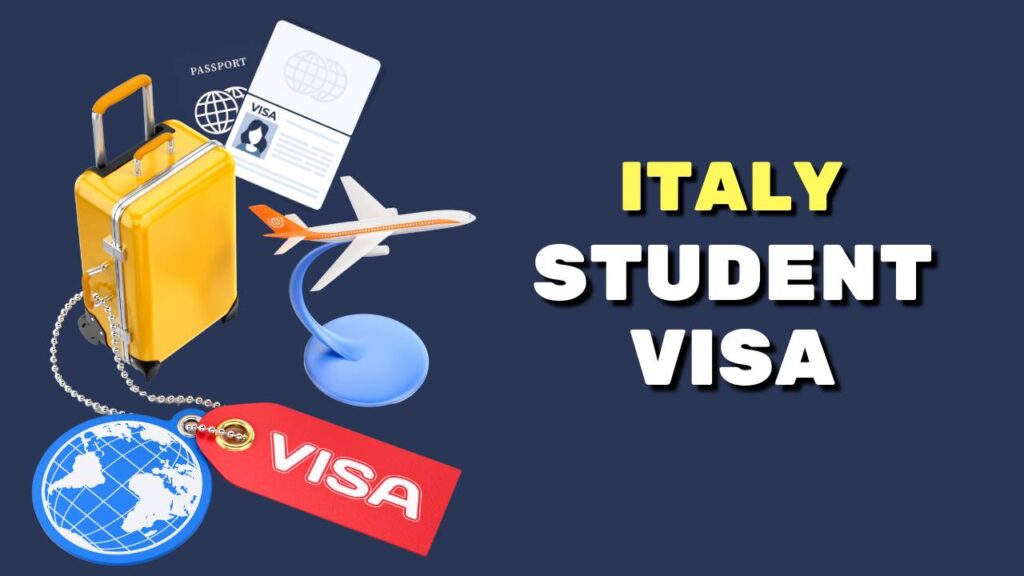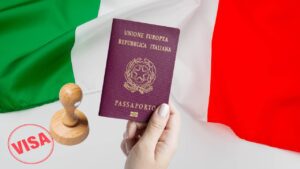Studying in Italy continues to attract thousands of international students every year, drawn by Italy’s rich history, world-class educational institutions, and vibrant cultural atmosphere. Italian universities offer a vast array of programs taught in both Italian and English, ranging from classical arts and humanities to cutting-edge technology and scientific research.
Before you start on your academic journey, obtaining an Italy Student Visa is a mandatory legal step for non-EU/EEA students who plan to study in Italy for longer than 90 days. This visa acts not only as your entry permit but also as a gateway to legally reside, work part-time under certain conditions, and access healthcare services during your stay in Italy. Navigating the Italy Student Visa process may appear daunting initially, but understanding the detailed requirements and procedures can ease your path significantly.
Will get an overview of the eligibility criteria, document checklist, and practical application tips that will help you confidently prepare your Italy Student Visa application.
What Is an Italy Student Visa?
The Italy Student Visa is a long-term national visa (type D) issued by Italian consulates or embassies abroad, designed specifically for students coming from countries outside the European Union and the European Economic Area. Unlike the short-stay Schengen tourist visa, which permits only up to 90 days, the student visa allows you to stay in Italy for the entire length of your academic program—whether that’s one semester, a full degree, or specialized research. It enables you to apply for a residence permit (permesso di soggiorno) once in Italy, which is required for longer stays and allows you to legally live, study, and sometimes work part-time.
This visa also serves as an assurance to Italian immigration authorities that you have genuine intentions to study and sufficient resources to support yourself during your stay. Without this visa, your chances of entering Italy for study purposes are slim, and you may face legal complications. Additionally, the student visa often offers flexibility to travel within the Schengen Area during your study period, making it a valuable document for those who wish to visit Europe.
Eligibility Criteria for Italy Student Visa
Understanding the eligibility requirements is critical, as your visa application will be assessed carefully based on these standards to ensure you have a legitimate academic purpose and the means to live in Italy without financial hardship.
1. Admission to a Recognized Institution
First and foremost, you need an official acceptance or enrollment confirmation from an accredited Italian university, language school, or academy. The institution must be recognized by the Italian Ministry of Education or other relevant authorities. The letter should clearly state your course of study, start and end dates, and indicate that it is a full-time program.
Part-time courses or informal training programs generally do not qualify for the student visa. Admission to postgraduate programs, undergraduate degrees, or specialized Italian language courses for foreign students are all valid options. Having a concrete academic plan and acceptance strengthens your visa application significantly.
2. Proof of Financial Means
Italian authorities require clear proof that you can financially sustain yourself during your entire stay, covering tuition fees, accommodation, food, transportation, and other living costs. This requirement is designed to ensure students do not become a financial burden on the state. The exact amount required may vary depending on the city; living costs in major cities such as Rome or Milan can be considerably higher than in smaller towns. Generally, a minimum monthly budget of around €450-€500 is expected.
Acceptable evidence includes recent bank statements, scholarship award letters, sponsorship affidavits from family members, or evidence of income. It is important that your financial documents show stable and sufficient funds, as inconsistent or unexplained finances may lead to visa refusal.
3. Health Insurance
Healthcare in Italy is of excellent quality but can be expensive for non-residents without insurance. To protect yourself against unforeseen medical expenses, all non-EU students must have valid health insurance that covers the entire duration of their stay. This insurance must include coverage for emergency treatment, hospitalization, and medical repatriation.
EU students can use their European Health Insurance Card (EHIC), but students from other countries must obtain private insurance accepted by the Italian consulate. Some universities may also offer health insurance packages, so be sure to confirm coverage details before purchasing. Having proper insurance is mandatory, and failure to provide valid proof may result in visa denial.
4. Clean Criminal Record
Maintaining public safety and security is a priority for Italy, and as such, some consulates require applicants to submit a police clearance certificate or a criminal record check from their home country or any country where they have lived for a significant period.
This document must usually be issued within the last six months and should certify that you have no criminal convictions, particularly for serious offenses. While this may not be mandatory in every case, submitting it proactively can help avoid delays and demonstrate your good conduct to the visa officers.
5. Accommodation Proof
Before traveling to Italy, you must demonstrate that you have arranged stable accommodation for your stay. This can be a university dormitory, private rental apartment, or a formal invitation from relatives or friends residing legally in Italy.
Accommodation documents must show your address and duration of stay. Some Italian consulates require this proof at the time of application, so securing accommodation early is advisable. This evidence reassures authorities that you will have a place to live and are less likely to face homelessness or resort to irregular housing arrangements.
6. Language Proficiency (if applicable)
While not always a strict requirement for the visa itself, many universities require proof of language proficiency depending on the medium of instruction. For programs taught in English, tests such as IELTS or TOEFL are often accepted, while Italian-taught courses may require certifications like CILS or CELI.
Demonstrating language skills not only strengthens your visa application but also prepares you to succeed academically and socially in Italy. If your program requires a specific language level, including this documentation in your visa file can expedite processing.
Required Documents for Italy Student Visa Application
Gathering the correct documentation is the cornerstone of a successful visa application. Each document must be complete, accurate, and submitted in the format requested by the embassy.
1. Completed Visa Application Form
You must fill out the national visa application form available on the Italian consulate’s website or visa application centers. It’s crucial to fill the form carefully and truthfully, as errors or inconsistencies can lead to rejection. The form should be signed and dated. Some consulates require you to submit the form online, while others accept paper forms.
2. Valid Passport
Your passport must be valid for at least six months beyond your planned departure date from Italy and contain at least two blank visa pages. A damaged or expired passport will not be accepted. If you hold multiple passports, bring all of them. Some consulates also require a copy of your passport data page.
3. Acceptance Letter from the Educational Institution
This official letter from your chosen university or school confirms your admission, specifying the program, course duration, and start date. The institution’s official letterhead, stamp, and signature add authenticity to the document. Having this letter demonstrates the academic purpose of your stay.
4. Proof of Financial Means
Recent bank statements (usually last three months) with clear balances, scholarship award letters, or affidavits of support from parents or sponsors must be submitted. If your finances come from a sponsor, provide a formal sponsorship letter along with their bank statements and proof of identity. This documentation must collectively show that you can cover tuition fees and living expenses for the entire study period.
5. Health Insurance Certificate
This must detail your insurance provider, coverage limits, policy number, and validity period. Make sure your policy covers all required medical expenses and emergencies. Some consulates require the insurance to be purchased from certain approved providers, so check their list carefully.
6. Accommodation Proof
Depending on your living arrangements, this might be a university dormitory acceptance letter, rental contract, or invitation letter from a host. These documents should clearly state the address, duration, and confirmation that you will be living there during your studies.
7. Passport-Sized Photographs
Photos must adhere to biometric standards: recent (less than six months old), with a white or light-colored background, clear full-face view, and no glasses or headgear (except for religious reasons). Usually, two to four photos are required.
8. Police Clearance Certificate
If required, provide a certificate issued by the police or relevant authority confirming you have no criminal record. This certificate should be recent and, if necessary, translated and legalized or apostilled.
9. Academic Records
Transcripts, diplomas, or certificates from previous education show your academic qualifications and preparedness for your chosen course. These may need to be translated into Italian or English and notarized.
10. Flight Itinerary (optional)
Some embassies ask for a confirmed but refundable flight booking to understand your travel plans. Do not buy non-refundable tickets until your visa is approved.
Step-by-Step Italy Student Visa Application Process
Understanding the entire process will help you avoid last-minute surprises and ensure timely submission.
Step 1: Obtain Your Admission Letter
Your journey begins with receiving the official acceptance letter from your Italian educational institution. This document is mandatory and should contain clear details about your course, including duration and start date.
Step 2: Book Your Visa Appointment Early
Book your appointment at the Italian consulate or visa application center as soon as possible. Appointments can fill up fast, especially during peak admission seasons like summer and early autumn. Delays in scheduling can push back your entire application timeline.
Step 3: Collect and Organize Documents
Collect all necessary paperwork well ahead of your appointment date. Make sure each document meets the consulate’s specifications and is translated and legalized if required. Organize documents in the order requested to facilitate smoother processing.
Step 4: Attend Your Appointment and Submit Application
Arrive at your appointment on time with all documents and copies. Some embassies require biometric data collection (fingerprints and photos). Be prepared to answer questions about your study plans and intentions honestly and confidently.
Step 5: Pay the Visa Fee
The visa fee varies but generally costs around €116. Payment methods differ by embassy and can include cash, credit card, or bank transfer. Always keep your payment receipt for reference.
Step 6: Attend an Interview (if required)
While not all applicants will be interviewed, some consulates may require an in-person interview to clarify aspects of your application, your study plans, or financial situation. Prepare well by reviewing your documents and being clear about your educational goals.
Step 7: Wait for Processing
Visa processing times vary but typically range from 15 days to up to 60 days in busy seasons or complex cases. Patience is key during this time. Avoid making irreversible travel plans until you receive your visa.
Step 8: Collect Your Visa and Verify Details
Once notified, collect your visa promptly and check all details carefully. Verify that your personal information, course duration, and entry type are correct. Report any errors immediately.
Essential Tips for a Successful Italy Student Visa Application
Applying for an Italy Student Visa requires careful preparation and honesty. Here are key tips to help you succeed:
- Start Early: Begin your application as soon as you get your admission letter. Early preparation helps avoid last-minute issues and ensures you have enough time to gather documents and book appointments.
- Maintain Transparency: Always provide genuine documents and truthful information. Any falsification can lead to visa rejection or permanent bans.
- Show Financial Stability: Provide clear proof of sufficient funds to cover tuition, living expenses, and other costs. This reassures visa officers of your financial capability.
- Follow Official Guidelines: Regularly check the official embassy website for updated requirements and instructions to avoid errors or delays.
- Prepare for Your Interview: Practice common questions about your study plans and future goals. Confidence and honesty during the interview can boost your chances.
- Keep Copies: Always keep copies of all submitted documents and receipts for your records and future reference.
- Respect Deadlines: Submit all documents and fees on time. Missing deadlines can delay or jeopardize your application.
FAQs
1. What is an Italy Student Visa?
An Italy Student Visa is a special visa issued to non-EU/EEA students planning to study in Italy for more than 90 days. It allows legal entry and residence for academic purposes.
2. Who needs an Italy Student Visa?
Non-EU/EEA citizens who want to study in Italy for longer than 90 days must apply for this visa before traveling.
3. How long does the Italy Student Visa process take?
The processing time varies but usually takes between 15 to 30 days. It’s advisable to apply at least 2-3 months before your course starts.
4. What documents are required for the Italy Student Visa?
Key documents include a valid passport, admission letter from an Italian university, proof of financial means, health insurance, accommodation proof, and a completed visa application form.
5. Can I work while studying in Italy on a student visa?
Yes, you can work part-time up to 20 hours per week during your studies, subject to specific conditions.
6. Is health insurance mandatory for the Italy Student Visa?
Yes, students must have valid health insurance covering their entire stay in Italy, either through an Italian health plan or private insurance.
7. How long is the Italy Student Visa valid?
The visa is typically valid for the duration of your academic program, up to one year, and can be renewed annually if you continue your studies.
8. Can family members accompany me on an Italy Student Visa?
Family members may apply for a family reunification visa, but this is a separate process and requires meeting additional requirements.
9. What happens after I arrive in Italy with my student visa?
You must register with the local police station (Questura) within 8 days to obtain a residence permit (Permesso di Soggiorno) for your stay.
10. Can the Italy Student Visa be extended or converted?
Yes, you can extend your visa if you continue your studies. Also, under certain conditions, you may convert it to a work visa after graduation.



